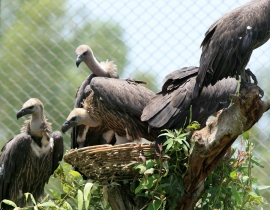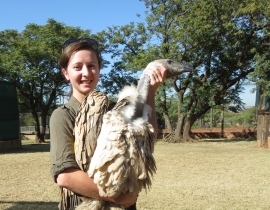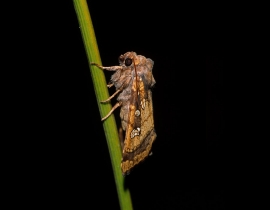Posted January 24, 2014 in Africa
Since 2009, Action for the Wild has been annually donating £1,000 to the Gyps Vulture Restoration project in Pakistan. The current Asian Vulture Crisis is caused by the veterinary drug diclofenac, which becomes toxic to vultures if they eat a dead animal that has been recently treated with the drug. The drug was banned in 2006, however since then, the most difficult task for vulture recovery has been the removal of the drug from the environment, and replacing it with the vulture-safe drug, meloxicam.
The scale of the problem is so large that it is not possible to try and cover entire countries. So instead Vulture Safe Zones (VSZ) have been established in vulture range states. These are defined areas that contain an existing population of vultures; the aim is then to work towards making the surrounding area free from diclofenac. The current Vulture Safe Zone in the Sindh Province in Pakistan is around 30,000km2; about 50% bigger than Wales! This is still a big task, as each town, village and livestock community needs to be visited.
To help facilitate this work, WWF-Pakistan organised a series of consultation and awareness-raising sessions in several villages in the VSZ. This then led to the formation of a local community based organisation called the Parker Foundation, whose role it is to implement the conservation activities within the zone. A poster has also been produced by WWF-Pakistan outlining the risks of diclofenac and highlighting the alternative safe drug.
At the same time, the VSZ has seen the introduction of livestock husbandry camps, aiming to improve animal husbandry techniques and reduce the use of veterinary drugs. Pharmacy surveys have also been completed, accessing the availability of diclofenac and what other drugs are available. There is a risk that drugs like ketoprofen, which is in the same class as diclofenac, will start to be used more. Meloxicam is currently the only vulture safe veterinary drug. Currently efforts are underway across the entire range of vultures to promote its use and for it to permanently replace vulture-unsafe drugs.
Action for the Wild’s funds are used for the conservation breeding centre at Changa Manga. Currently there are no plans to expand the centre, which continues to operate one large communal aviary that can house approximately 35 birds, and 4 small aviaries. The current size of the centre will be sufficient to meet the goals set out by the project. The incubation facilities have now been fully established at the centre, which also now have a powerful generator for back up power when required. The primary supervisor has also been trained on how to operate the equipment, and manage the hatching and rearing of any chicks.
The 2012/13 breeding session again proved eventful, with 3 fertile eggs and 2 chicks hatching. Although the chicks only survived for 30 days, staff are still very encouraged. Early signs for the 2013/14 breeding session are encouraging with currently 3 pairs nest building and showing courtship behaviour. There are a possible 2 more pairs that may be preparing to breed as well. The large aviary currently has a total of eight nesting areas available for the vultures to use.
The cost of supplying food and the facility is growing. To try and reduce these costs the project has established a small breeding group of rabbits to provide supplementary food for the vultures. There is also a small group of goats and it is expected that these food supplies will grow over time.
Colchester Zoo looks forward to hearing more from the project during 2014.
Gyps vulture looking after an egg © Gyps Vulture Project.



